|
|
|
Sort Order |
|
|
|
Items / Page
|
|
|
|
|
|
|
| Srl | Item |
| 1 |
ID:
167758


|
|
|
|
|
| Summary/Abstract |
EVERY EMPLOYEE of the Russian Foreign Ministry - former, current or future - was, is or will be (in one way or another) involved in consular work, which is an integral part of the diplomatic service. On May 15, 2019, we mark a significant date in the history of the Russian Foreign Ministry - namely, the 210th anniversary of the consular service. This day more than two centuries ago, Emperor Alexander I approved a proposal by the Russian Foreign Minister, Count N.P. Rumyantsev regarding the establishment of the department of consular affairs. It should be noted that by that time (and even before the Foreign Ministry of the Russian Empire was established), there were already over 20 consular offices abroad. Expanding their network and organizing a specialized subdivision within the ministry was dictated by the pressing need to ensure the observance of the legitimate rights and interests of Russian citizens abroad.
|
|
|
|
|
|
|
|
|
|
|
|
|
|
|
|
| 2 |
ID:
167762
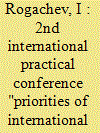

|
|
|
|
|
| Summary/Abstract |
On March 29, 2019, the Russian Foreign Ministry and the Russian Internal Affairs Ministry held the 2nd International Practical Conference "Priorities of International Cooperation in Countering Extremism and Terrorism" at the V.Ya. Kikot Moscow University of the Russian Internal Affairs Ministry.
|
|
|
|
|
|
|
|
|
|
|
|
|
|
|
|
| 3 |
ID:
167749
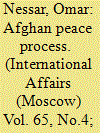

|
|
|
|
|
| Summary/Abstract |
LATE IN 2018 and early in 2019, Moscow hosted two very important events related to peace settlement of the Afghan conflict which had been going on for over 30 years. In November 2018, the Moscow Format of consultations on Afghanistan brought together delegations of Afghanistan and the Taliban1; in February 2019, Moscow hosted an inter-Afghan dialogue between representatives of the legitimate political forces and the Taliban.
|
|
|
|
|
|
|
|
|
|
|
|
|
|
|
|
| 4 |
ID:
167763
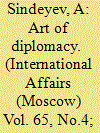

|
|
|
|
|
| Summary/Abstract |
THE BASIC OBJECTIVES of diplomacy do not change with the passing of time. Diplomacy is tasked with securing conditions for maintaining and developing the state, society and its inherent culture. This simple assertion requires three clarifications: Diplomats are generally the first to deal with problems and potential conflicts that arise, which means they are the first line of defense of that country's interests; as state officials, diplomats act within set frameworks, and independence and improvisation are a rather rare and perforce exceptions to the rule; national interests are almost always stable and have nothing to do with the political regime in the country.
|
|
|
|
|
|
|
|
|
|
|
|
|
|
|
|
| 5 |
ID:
167748
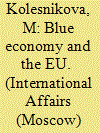

|
|
|
|
|
| Summary/Abstract |
THE UNITED NATIONS General Assembly Resolution "Transforming Our World: The 2030 Agenda for Sustainable Development," adopted on September 25, 2015, defined 17 Sustainable Development Goals (SDGs) and 169 targets. Achieving those objectives, which will be pursued by "all countries and interested stakeholders," should promote human prosperity and at the same time "secure the planet" [1]. A special target area, SDG 14, is devoted to the world's oceans and contains the phrase: "Goal 14: Conserve and sustainably use the oceans, seas and marine resources for sustainable development." It contains seven core objectives. The inclusion of maritime issues on the list of topics of special importance for life-sustaining human activity reflects the desire of the international community to strike a balance between developing maritime activity (economic, scientific research, military) and conserving the marine environment amid the growing impact of human actions.
|
|
|
|
|
|
|
|
|
|
|
|
|
|
|
|
| 6 |
ID:
167747


|
|
|
|
|
| Summary/Abstract |
THE BRICS countries attach great importance to cooperation with UNIDO (170 member states) as a specialized agency in the United Nations system that has great potential for expanding and deepening cooperation among the five states in providing technical assistance in promoting advanced industrial technologies and practices, as well as implementing projects to promote and accelerate international development with the participation of other developing countries.
|
|
|
|
|
|
|
|
|
|
|
|
|
|
|
|
| 7 |
ID:
167751


|
|
|
|
|
| Summary/Abstract |
HE CRISIS in Venezuela is difficult to understand outside the context of turbulent changes in Latin America and the Caribbean (LAC).
Around the end of the 20th and the beginning of the 21st century, the United States began to lose its positions in LAC. The United States retains considerable political clout in LAC and still plays the key role in its economy, remaining its main source of financing and the chief market for its goods, mainly commodities and food, but the Americans have European Union countries and China snapping at their heels, and, moreover, Russia has been winning back political ground that it lost in the region.
|
|
|
|
|
|
|
|
|
|
|
|
|
|
|
|
| 8 |
ID:
167764


|
|
|
|
|
| Summary/Abstract |
WORLD WAR I changed the political map of Central and Eastern Europe. In 1918-1919, the breakup of the regionally dominant Austro-Hungarian and Russian empires and a significant weakening of Germany led to the emergence of eight new states in the region: Austria, Hungary, Czechoslovakia, Poland, Lithuania, Latvia, Estonia, and Finland. For the five countries of Southeastern Europe that gained independence in the 19th century (Greece, Bulgaria, Albania, Romania, and Serbia) with the disintegration of another great power, the Ottoman Empire, which had lost many territories and emerged as the Republic of Turkey, the conditions of existence changed significantly. Serbia became the core of a new state, the Kingdom of Serbs, Croats, and Slovenes, renamed Yugoslavia in 1929.
|
|
|
|
|
|
|
|
|
|
|
|
|
|
|
|
| 9 |
ID:
167754


|
|
|
|
|
| Summary/Abstract |
LET ME first share a story I heard from a diplomat of the Russian Embassy in Morocco. This happened in Rabat during the January visit of Foreign Minister of Russia Sergey Lavrov to North African countries. Out of sheer curiosity and trying to understand their motives and their expectations, this man spoke to several refugees moving to Europe. One of them, 27-year-old literary critic (!) from Cameroon, explained: his family was not rich; he had four brothers and a small house with a plot of land. When asked why he was moving to Europe, he answered that he "was hungry" but admitted that he did know how to plant potatoes. He was absolutely convinced that in France he would be accommodated; that there would be enough food; that he would be able to realize his potential and would be welcome probably at the Sorbonne.
|
|
|
|
|
|
|
|
|
|
|
|
|
|
|
|
| 10 |
ID:
167752


|
|
|
|
|
| Summary/Abstract |
THE RUSSIAN FOREIGN MINISTRY increasingly sees the current state of international relations as a dangerous no-rules game. One comes to this conclusion when one sees the established world order falling apart and international treaties that have done such a good job to so many countries, guaranteeing global security and stability for many decades, being called into question or just ignored. General Charles de Gaulle's quip that "treaties are like roses and young girls" because "they last while they last" isn't very comforting. One is tempted to comment that, after all, stability is better than instability. But it is the global business community that today's transition from the old world order to a new one is hitting particularly hard - it has involuntarily become a hostage to geopolitical games.
|
|
|
|
|
|
|
|
|
|
|
|
|
|
|
|
| 11 |
ID:
167756
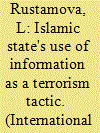

|
|
|
|
|
| Summary/Abstract |
ISLAMIC STATE (IS, an organization banned in Russia and also known as the Islamic State of Iraq and Syria or ISIS and the Islamic State of Iraq and the Levant or ISIL) became an actor in world politics quite recently but showed its nature as a threat to international peace and security as soon as it came onto the global political scene. Some scholars, among them Jessica Stern, J.M. Berger,1 Georgy Mirsky,2 Stephen Walt,3 and Alexey Volynets,4 see IS as a state-like entity because it does possess (although the past tense would be more appropriate) basic characteristics of a state - it controls a populated territory, has a government system similar to that of any modern state, and maintains relations of some kind with other states.
|
|
|
|
|
|
|
|
|
|
|
|
|
|
|
|
| 12 |
ID:
167757


|
|
|
|
|
| Summary/Abstract |
RAPID technological development has accelerated globalization processes around the world, removing borders not only between countries but also between continents. The concept of soft power that America has been actively using in recent decades has exhausted its toolkit and requires new means of expression. This concept emphasizes not the military potential of a state but its cultural values, scientific achievements and diplomatic skill.
|
|
|
|
|
|
|
|
|
|
|
|
|
|
|
|
| 13 |
ID:
167760


|
|
|
|
|
| Summary/Abstract |
DEAR COLLEAGUES and friends, this is the first in a series of meetings with ambassadors of foreign countries to Russia that has been organized by the journal International Affairs with support from the Diplomatic Academy of the Russian Ministry of Foreign Affairs. I'm pleased to welcome Mr. Carlos Rafael Faria Tortosa, Ambassador Extraordinary and Plenipotentiary of Venezuela, at this first meeting.
|
|
|
|
|
|
|
|
|
|
|
|
|
|
|
|
| 14 |
ID:
167755
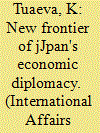

|
|
|
|
|
| Summary/Abstract |
ECONOMIC DIPLOMACY as a phenomenon of international life has been attracting numerous analysts as it unfolds against the background of the rapidly changing situation in the world economy and practices of individual countries that suggest their own interpretations and create new instruments.
|
|
|
|
|
|
|
|
|
|
|
|
|
|
|
|
| 15 |
ID:
167761


|
|
|
|
|
| Summary/Abstract |
THE 75TH ANNIVERSARY of the establishment of diplomatic relations between New Zealand and Russia is a chance for us to reflect together on the history of our bilateral relationship to date, and on how this relationship might develop further in our rapidly changing world. Our diplomatic relationship was established at a time when war was raging in Europe and threatening the global community. New Zealand was among the first countries to declare war on Nazi Germany. Our commitment to the war effort in Europe was in no way limited by our geographical distance. Approximately 140,000 New Zealanders - nearly nine percent of our total population at the time - served in the war.
|
|
|
|
|
|
|
|
|
|
|
|
|
|
|
|
| 16 |
ID:
167767


|
|
|
|
|
| Summary/Abstract |
IN CONNECTION WITH the 30th anniversary of Mikhail Gorbachev's trip to Beijing, some incidents and stories come to mind that took place along the difficult path through historical deadlocks and prejudices that eventually led to the normalization of Soviet-Chinese relations.
|
|
|
|
|
|
|
|
|
|
|
|
|
|
|
|
| 17 |
ID:
167744


|
|
|
|
|
| Summary/Abstract |
THE MONTH OF MAY and its fireworks are now behind us. The country and the world celebrated Victory Day, which is a holiday of war veterans, home front workers, and all the people of Russia and other victorious nations. There was a grand parade on Red Square and a wreath-laying ceremony at the tomb of the Unknown Soldier. The march of the Immortal Regiment - a civil initiative that has acquired a truly global dimension - took place again not only in Russia, but in many other countries as well, with the participation of hundreds of thousands of Russians, our compatriots abroad and citizens of other countries - all people who cherish the memory of Victory and the memory of those who worked to bring it closer.
|
|
|
|
|
|
|
|
|
|
|
|
|
|
|
|
| 18 |
ID:
167745


|
|
|
|
|
| Summary/Abstract |
THE PALESTINIAN PROBLEM is one of the worst headaches of the Middle East and one of the greatest geopolitical challenges.
The Soviet Union/Russia, which was present when it originated, was one of the countries that tried to resolve problems related, among other things, to Israeli and Palestinian statehood and the fact that Palestine is the cradle of three world religions - Christianity, Islam and ludaism.
|
|
|
|
|
|
|
|
|
|
|
|
|
|
|
|
| 19 |
ID:
167759
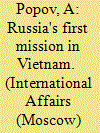

|
|
|
|
|
| Summary/Abstract |
IN THE SECOND HALF of the 19th century, amid a growing rivalry between colonial powers in China and Southeast Asia, the Russian Empire continued to strengthen its positions in the Far East, in particular on its Pacific coast. The newly established Pacific Squadron made long sea voyages. Merchant ships of the Russian Steam Navigation and Trading Company and the Russian Volunteer Fleet plied between Vladivostok and Black Sea ports. Under those circumstances, the port city of Saigon, a rapidly growing center of French Indochina located at the intersection of the main sea routes, was bound to attract the attention of the Russian tsarist authorities.
|
|
|
|
|
|
|
|
|
|
|
|
|
|
|
|
| 20 |
ID:
167750


|
|
|
|
|
| Summary/Abstract |
A COUNTRY'S IMAGE in the minds of those who live inside and outside it depends on the logic and goals of its development. In the process of construction, its elements might differ by time and resources needed to create and consolidate them. The result, likewise, may be different where the length of time needed to produce the desired effect and the effect itself are concerned. An image of a country responsible for the development of mankind and its security is time- and resource-consuming to the greatest extent while inevitable contradictions between global responsibility and national interests make it idealistic and unachievable. Many countries, however, claim the status of responsible - either regional or global - powers depending on their scope and development goals.
|
|
|
|
|
|
|
|
|
|
|
|
|
|
|
|
|
|
|
|
|